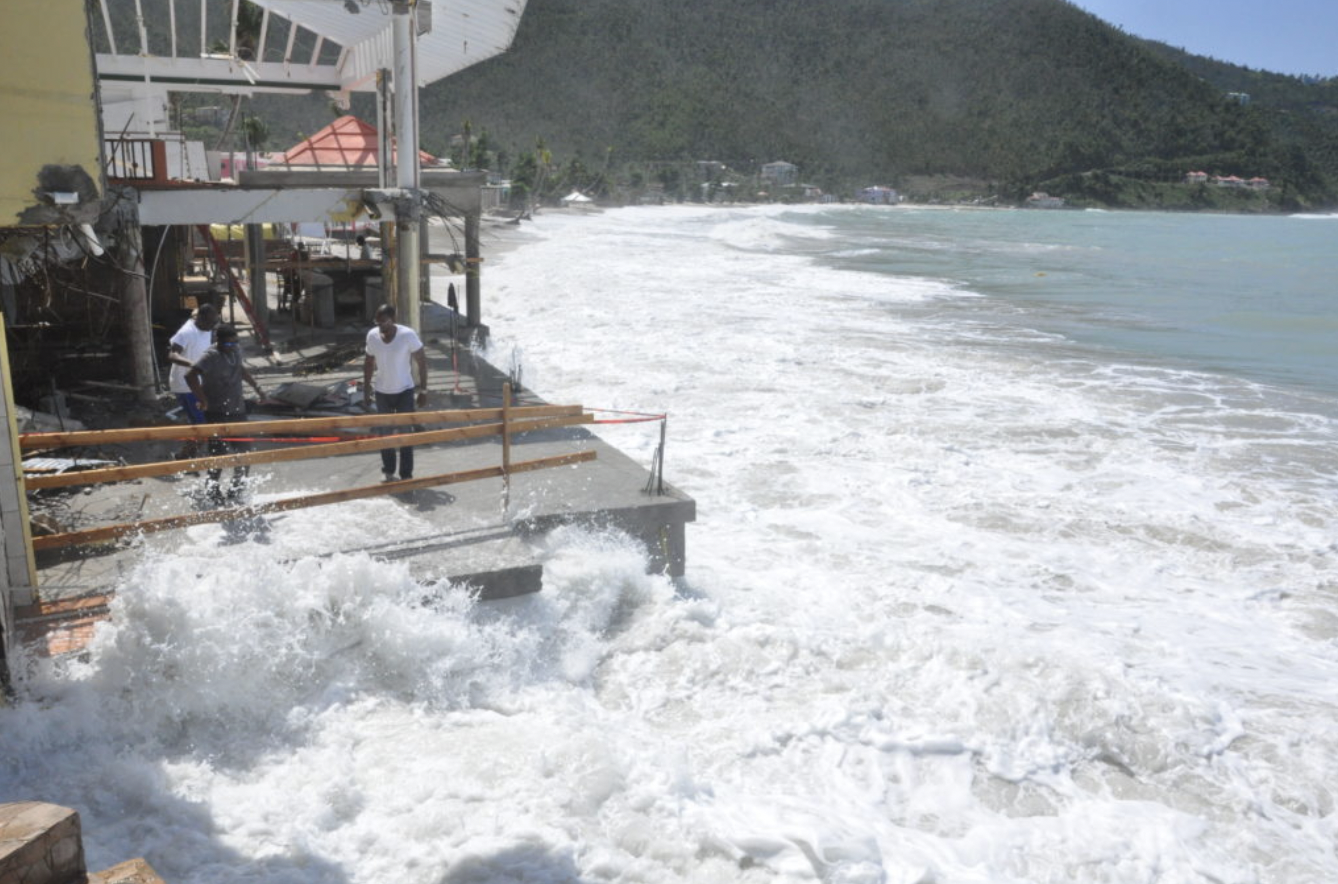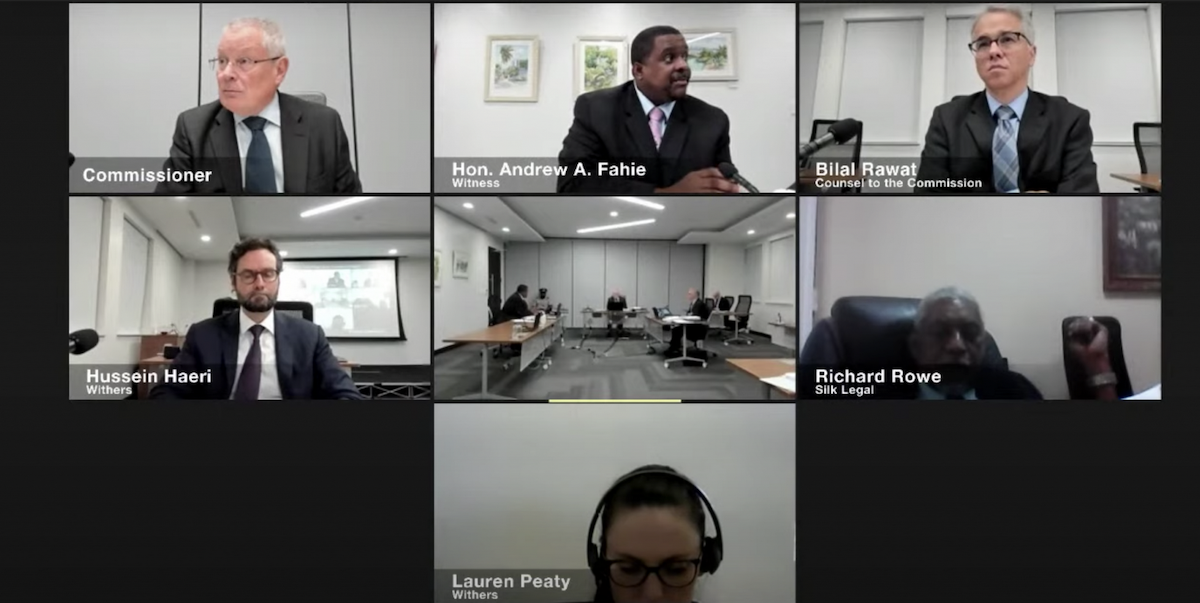Four years later, climate board is back
[ad_1]
Less than two months after then-Premier Andrew Fahie’s Virgin Islands Party government came to power in February 2019, the Cabinet unlawfully revoked the membership of the VI Climate Change Trust Fund Board.
This month, the board was finally reinstated by Mr. Fahie’s successor, Premier Dr. Natalio “Sowande” Wheatley.
All four private-sector members appointed on June 6 — Chairman Edward Childs, Deputy Chairman John Klein, Dr. Shannon Gore and Ronnie Lettsome — previously served on the board before they were removed at Mr. Fahie’s direction in April 2019.
The two other former members, Shelly Bend and Dr. Katherine Smith, were unable to continue serving, so the board will advertise for new representatives from the financial sector and an academic or research organisation, according to government.
The ex-officio board members are Financial Secretary Jeremiah Frett and Ronald Smith-Berkeley, the permanent secretary of the new Ministry of Environment, Natural Resources and Climate Change.
Dr. Wheatley, who heads that ministry, addressed the board members during an appointment ceremony on June 6.
“I want to take this opportunity to personally apologise to you for the previous disruption in your service as members and assure you that you will have this government’s full support and respect as you fulfil your mandate on the board,” he told them.
“This commitment of support includes providing the trust fund with the necessary seed funding to ensure that you can make significant strides towards operationalisation this year.”
He also praised their previous work after they were first appointed in 2017, which included drafting an operations manual, developing a website, creating a logo, and producing an annual report.
“I think it is also important to highlight to the public that you all served without compensation and even gave of your personal funds to ensure that basic things could be put in place to further the operationalisation of the trust fund,” the premier said.
Board’s duties
As the manager of the trust fund, the independent board is charged with mobilising, managing and disbursing international financing to respond to climate change by supporting local projects and programmes.
“As members of the board, you have an important charge, and you will lead the trust fund through the critical stage of its operation — moving the trust fund from an institution conceived in law to a functional entity ready and able to deliver for the people of the Virgin Islands,” the premier told the members.

Mr. Childs said the board’s top priority will be securing the seed funding to support establishment of a secretariat, enable international fundraising efforts, and ultimately launch the fund’s first public call for proposals for projects.
Board history
The trust fund was the first of its kind in the region when it was established in 2015 with the passage of the VI Climate Change Trust Fund Act.
However, progress since then has been slow at best.
The board members were first appointed in July 2017 under the former National Democratic Party-led government, and they got to work with the help of donations from their own pockets even though a tourist levy that is supposed to help finance their activities never reached the fund.
But less than two months after the VIP came to power in the February 2019 general election, all six private-sector board members received letters from Mr. Fahie, the newly appointed premier, seeking their voluntary resignations, Mr. Childs told the Commission of Inquiry during one of its public hearings in 2021.
Board members, however, worried that the collective loss of their experience could be detrimental to the body’s future success, according to Mr. Childs. So instead of resigning as requested by Mr. Fahie, they wrote back and asked him for a meeting, but they never received a response, he said.
Not long afterward, a public announcement from the Cabinet Office confirmed the members’ termination.
New ‘policy’
Mr. Fahie said in 2019 that Cabinet revoked the memberships because of a new “policy” limiting board terms to mirror the “lifespan” of the government in power.
The Climate Change Trust Fund Act, however, does not appear to give Cabinet that power.
Under the law, the minister responsible for the trust fund can revoke a board member’s appointment for one of five reasons: misconduct; lack of attendance; an undeclared conflict of interest; not fulfilling the conditions of an appointment; or acting detrimentally against the trust.
Mr. Childs told the COI in 2021 that none of those five reasons applied to him — or, to his knowledge, any of the other members.
COI Commissioner Sir Gary Hickinbottom agreed, condemning the former government’s decision in his report last year.
“There can be little doubt that [Mr. Fahie], and the Cabinet following him, wished to have ‘his own’ men and women appointed to the CCTF Board,” Sir Gary stated in his report. “He has made his discontent known as to the position of the CCTF fund being independent of executive government.”
Sir Gary added that the approach to the removal of the fund’s board members “raises deep concerns about the lengths to which the executive will go to manipulate the membership of statutory boards.”
Since the CCTF board seeks funding from international climate change bodies, good governance and independence are required under its enabling legislation, the commissioner noted.
His report added that elected officials dismantled the board even though they knew the move was unlawful.
“On the evidence, it is clear that (and I find that), on the attorney general’s advice, the premier accepted that he and Cabinet appreciated the decision to revoke would be unlawful, but they proceeded with it anyway, keeping their fingers crossed that nobody challenged it by way of judicial review,” Sir Gary wrote.
After Cabinet revoked the board memberships in 2019, Mr. Fahie promised repeatedly that new members would be appointed soon. But they weren’t.

Funding
Mr. Childs also told the COI in 2021 that the fund needed money.
Since 2017, tourists have been paying a $10 environmental levy on arrival, 40 percent of which initially was intended to go to the trust fund to facilitate operations like setting up a secretariat; hiring a CEO; and seeking outside investments, Mr. Childs said at the time.
But the money never reached the fund, he said, explaining that legislative changes were needed because the laws creating the trust and the levy “didn’t talk to each other.”
In December 2018, he added, Cabinet decided a way forward, but the decision never passed the House of Assembly.
“So we never actually benefited from those funds,” Mr. Childs said.
Finance officials have previously told the Beacon that the eco-levy earnings had not been tapped by other entities either for the same reason.
Officials did not provide an update about the eco-levy funds at the June 6 ceremony.
[ad_2]
Source link


